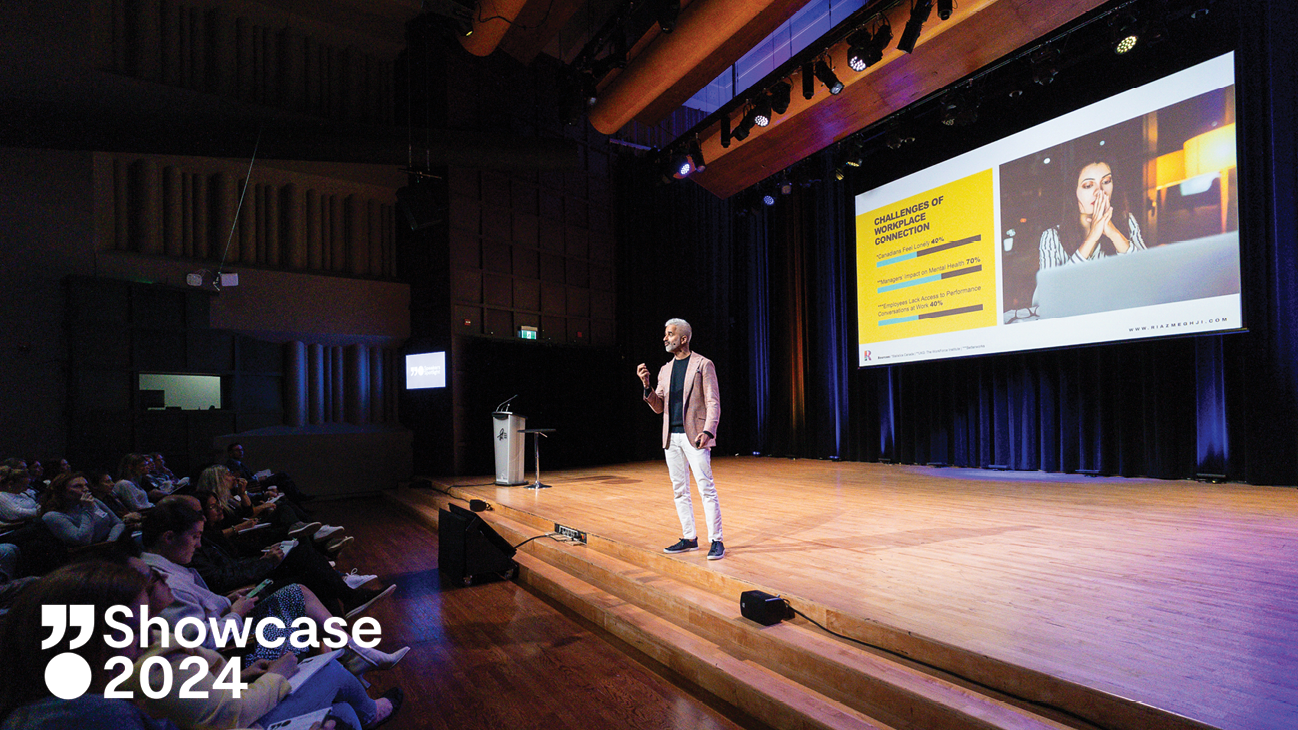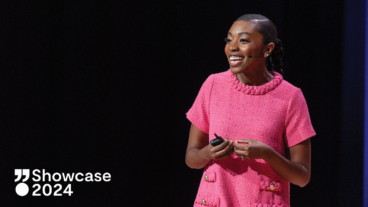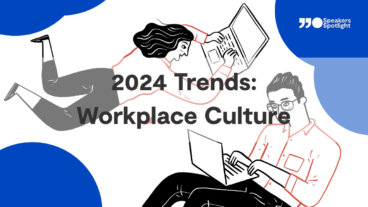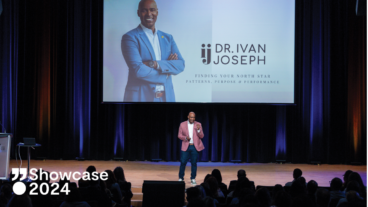We are always one conversation away from a completely different life. In our hybrid world, amidst a loneliness epidemic, connection has never been so crucial. The good news? The best way to drive connection is free and already equipped in our arsenal — the art of conversation.
Human connection expert Riaz Meghji joined us at Showcase 2024 to share insight into how we can make every conversation count. He spent decades on television interviewing experts on current affairs, sports, entertainment, politics, and business. Today, he is the bestselling author of Every Conversation Counts: The 5 Habits of Human Connection That Build Extraordinary Relationships and an in-demand keynote speaker for his expertise on creating engaged and connected cultures through the power of candid conversation.
At Showcase 2024, Riaz captivated the audience with his emotionally charged keynote that illustrated the power of empathetic curiosity to drive meaningful connections at home and work.
“Riaz was fantastic! I took away a lot both personally and professionally from what he shared.”
Showcase 2024 attendee
The Cost of Loneliness
According to Stats Canada, 40% of all Canadians identify as being lonely. They are lacking meaningful human connection. Why does this matter at work? Because lonely workers are twice as likely to take a sick day and five times as likely to miss work due to stress. In America alone, loneliness is costing companies $154 billion dollars a year.
Building on this, a study by UKG Workforce Institute, which surveyed 3400 employees across 10 countries, reported that 70% of respondents said their manager has a greater impact on their mental health than their doctor or therapist, and equal to that of their partner. Leaders are no longer just managing workloads and responsibilities, Riaz said, they’re managing energy and emotion.
And while 90% of senior leaders feel their performance management process is on point according to a report from Betterworks, only 55% of their employees agree. The biggest pain point contributing to this, Riaz said, is that 2 out of 5 employees say they lack access to critical conversations, such as peer feedback or one-on-ones with their managers, and it’s stunting their growth.
“If we do not make time for connection, we will have to make time for misunderstanding,” Riaz said. “Research shows that 90% of the time, we’ll send a text or an email and think we’re being crystal clear, and 50% of the time, our message is misunderstood.”
Level Up Your Conversations Through Empathetic Curiosity
So, how can we make our conversations count? By working on the quality of our questions. Approaching conversations with empathetic curiosity is a trust accelerator. It creates positive emotion in our conversations and deepens connection.
If you’re meeting someone new, Riaz recommends that you draw from the happiness equation to inform your questions. It says that the happiest people have three things in common: something to do, someone to love, and something to look forward to. Centre your questions around those three things — what is the thing that makes you come alive? What are the relationships that matter most to you? What are you looking forward to?
If you already have rapport with someone, frame your questions within the context of “ask first to talk second”, Riaz said. Studies have shown that questions starting with “how” and “what” lead to more expansive responses — more opportunity for human connection — than “who”, “when”, and “where”.
On the flipside, how we respond to questions can also amplify emotion and take conversations deeper, Riaz added. If someone asks, “how are you?”, make a conscious choice to use a different word than the usual suspects. Instead of saying, “good”, “fine”, etc., say you’re feeling optimistic, intrigued, curious, you’re struggling, etc.
In your conversations, always look for the opportunity to ignite self-reflection and self-discovery to take your relationships deeper, Riaz said.
Tackling the Tough Conversations
Conflict is a natural part of being human. No matter the time we put into building trust and deepening connection, there will always be roadblocks and differences of opinion. What’s important is how we show up in these sensitive moments, Riaz said.
Often, when we have to deliver bad news, we get stuck in our heads. We obsess over how others may react, forgetting what its like to be the recipient of that information. Turn reaction into reflection through empathetic curiosity, Riaz said. Put relationships first and logic second.
For example, maybe they’re experiencing a difficult time right now, maybe they are just stuck. Instead of jumping in and trying to fix their problems, involve them in the solution. Ask them, what do you feel is impossible right now? What do you think would make it possible? “Look at you” is always so much greater than “look at me”, Riaz said.
Riaz ended his presentation with this poignant note: “If we prioritize connection, when we can build trust, we will find a way in those sensitive conversations to call people up instead of call people out,” he continued. “If we prioritize connection regardless of the context of our workspace, we will be able to enhance collaboration and break through cross-functional silos. And if we prioritize connection, each and every one of us in this room — when we care about each other as professionals but more importantly as people — we will all be able to win.”
Hire Riaz Meghji to Speak at Your Next Event
After one conversation led him to take a dramatically different career path that changed his life for the better, Riaz became dedicated to exploring the ways that authentic human connection can change lives and organizations.
In an age of polarization, disconnection, and shallow substitutes for real relationships, Riaz shows audiences how to build and maintain meaningful relationships.
Contact us to learn more about Riaz Meghji and how his candid and far-ranging look at the art of conversation can help audiences reinvent themselves, re-energize their teams, and further develop their business.




